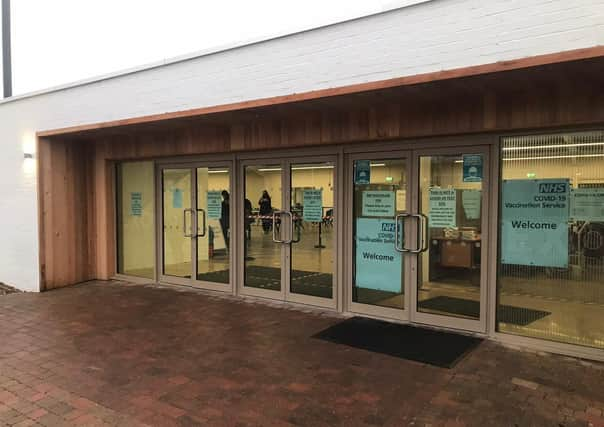Lincolnshire coronavirus: Vaccine roll-out will continue to be age-based not based on occupations, as health bosses reveal Operation Eagle plans to combat variants


The plan is called ‘Operation Eagle’ and would include surge testing and contact tracing to find where the variant first appeared in Lincolnshire.
The Kent mutation is present in the majority of cases in Lincolnshire and is known to be around 70 per cent more transmissible, but not more dangerous.
Advertisement
Hide AdAdvertisement
Hide AdVariants of concern include the South African mutation which can spread more rapidly and vaccines might not work quite as well against it.
However, there is no evidence it causes more serious illness for the majority of those who come into contact with it either.
Health bosses also said that vaccinations should increase after next week due to current supply issues, and that infection rates will rise in the coming weeks following schools returning.
Professor Derek Ward, Director of Public Health for Lincolnshire County Council said: “We haven’t had any variants of concern, or variants of interest, or not been notified of any. We do have a plan about what we would do if we did.”
Advertisement
Hide AdAdvertisement
Hide Ad“Every area has been asked to draft a version of what they would do using Operation Eagle so we’ve got that, and that’s been discussed with our Lincolnshire Resilience Forum and our local outbreak engagement board with our leaders.”
He added: “If we find a variant of concern in a specific area, we would go in very quickly with a mobilised and quite large part of our workforce to do enhanced testing and contact tracing, so that we can understand where that particular variant has come from.”
Through this, they will try to find the ‘index case’ which is the first person who caught the COVID variant and trace contacts from there.
Professor Ward added that vaccine supply shortages should be back on track soon.
Advertisement
Hide AdAdvertisement
Hide AdHe said: “We have had less vaccines over this week, and it’s likely to last for another week or so, and then vaccine supply issues should loosen, so we’ve not been able to use all of our capacity for vaccination because we simply haven’t had enough of the vaccine.”
This comes as the weekly vaccine data released on Thursday showed 237,027 jabs have taken place between December 8 and February 21 in Lincolnshire — up by 34,228 on the previous week. However, that figure was lower week on week (36,828 last week and 38,365 the week before).
Professor Ward expects infection rates to rise over the next weeks when children go back to school on March 8.
He said: “I expect we will see an increase in our rates and as long as that doesn’t translate into an increase in our hospital admissions and, therefore, increase in deaths. Clearly that’s a trade-off from a medical perspective we need to make.”
Advertisement
Hide AdAdvertisement
Hide AdIn Lincolnshire, asymptomatic rapid lateral flow tests have surpassed 21,000 as of Thursday evening with just over 300 positive cases since rapid testing started in the county.
The UK Government has today announced that the independent Joint Committee on Vaccination and Immunisation has published its interim advice for phase two of the COVID-19 vaccination programme, setting out that the most effective way to minimise hospitalisations and deaths is to continue to prioritise people by age.
A government spokesman said: “This is because age is assessed to be the strongest factor linked to mortality, morbidity and hospitalisations, and because the speed of delivery is crucial as we provide more people with protection from COVID-19.
“All four parts of the UK will follow the recommended approach, subject to the final advice given by the independent expert committee. The UK Government remains on course to meet its target to offer a vaccine to all those in the phase one priority groups by mid-April, and all adults by the end of July.”
Advertisement
Hide AdAdvertisement
Hide AdThis means calls to vaccinate key workers such as police, teachers and public transport workers as a priority will not go ahead apart from those in an age group deemed more at risk.
People in their 40s will be next after the most at risk age groups are vaccinated, followed by those aged 30-39.
Priority based on jobs would be “more complex” and could slow down the programme, the JVCI says.
The JCVI are the independent clinical and scientific experts who advise Government on which vaccine/s the UK should use and provide advice on prioritisation at a population level.
Advertisement
Hide AdAdvertisement
Hide AdAs of yesterday, 18,691,835 people have received a vaccination across the UK.
The government says its objective for the next phase of vaccine rollout is to further reduce mortality, morbidity and hospitalisations
The final advice from the JCVI will be published in due course.